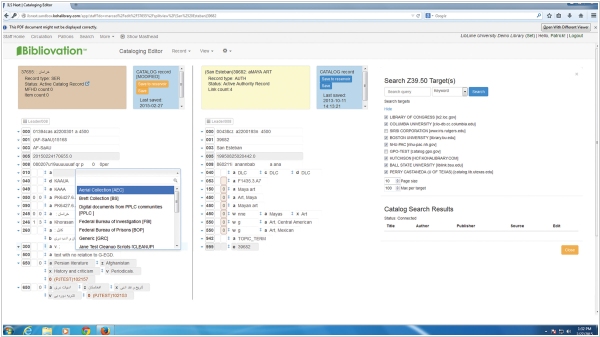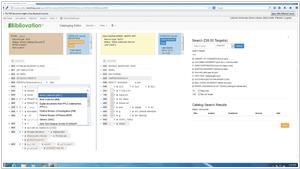Bibliovation alternatives
Bibliovation is the only Library Services Platform with a totally integrated capability for managing digital collections. Since 2005, LibLime has been at the forefront of providing library management software solutions. Our librarians, software engineers and information technologists work closely with our customers to create the best workflow solutions. The best Bibliovation alternative is Koha
Here are the latest news about Bibliovation:
2023. Bibliovation 7.2 gets online payment options

LibLime introduces the latest version of its ILS software Bibliovation 7.2. It is entirely web-based, granting researchers, library staff, and system administrators access through web browsers. By leveraging the FedRAMP authorized IaaS and PaaS certification from Amazon AWS Cloud, along with a special security authorization from the US Department of Defense's cybersecurity experts for SaaS, Bibliovation provides libraries with a highly secure and cost-effective hosting solution. It supports various standards such as MARC21, Dublin Core, RDA, and geotagging, enabling libraries to manage both physical and digital content on a single Rest API-based platform. The Bibliovation circulation subsystem is purpose-built to facilitate shared union catalog solutions, granting individual consortium members significant autonomy, including ownership of local bibliographic records, item records, and patron records. Bibliovation MARC cataloging allows for local control over cataloging rules that can complement or surpass AACR2 and RDA rulesets. The acquisitions subsystem in Bibliovation is EDI-compliant, featuring a multi-tiered fund hierarchy and supporting the import of csv data converted into the MARC21 format for streamlined acquisition workflows. Additionally, Bibliovation now includes online payment options and comprehensive NCIP support. With hosted production, reporting, and test systems, libraries have the necessary capabilities and control to effectively support their daily operations.
2021. Federal Government Library selects Bibliovation

A federal government library based in Massachusetts has chosen Bibliovation as its new Library Services Platform (LSP). The library has initiated the implementation process and aims to have Bibliovation fully operational by the end of October. Bibliovation offers the necessary technical capabilities to meet the library's workflow requirements, and the cost proposal from LibLime aligns with the library's budget constraints. LibLime will collaborate closely with the library staff to provide implementation and support services, ensuring the October go-live target is achieved. The Bibliovation LSP is entirely web-based, enabling researchers, library staff, and system administrators to access the system through web browsers. By leveraging the FedRAMP authorized IaaS and PaaS certification provided by the Amazon AWS Cloud, Bibliovation offers libraries a secure and cost-effective hosting solution.
2014. Bibliovation adds new Discovery Layer

LibLime introduces the official launch of Bibliovation 5.6. It revolves around a novel Discovery Layer within the application. It is constructed using a RESTful API, enhancing local customization and enabling seamless integration with crucial third-party products and resources utilized in today's academic libraries. The release also includes noteworthy additions such as the ability to merge authority records, an OPAC editor, and support for mobile devices. Similar to earlier versions, the entire Bibliovation application operates within the Plack environment, resulting in improved performance. Additionally, Bibliovation utilizes the Solr search engine, a widely popular open-source enterprise search platform derived from the Apache Lucene project. Solr boasts exceptional scalability, facilitating distributed search and index replication. This technology empowers the search and navigation functionalities of numerous prominent internet sites across the globe.
2007. LibLime acquires library management software Koha

LibLime has completed the acquisition of the Koha division from Katipo Communications Ltd, the original creators of Koha. The acquisition involved various assets, including existing support contracts with libraries that had partnered with Katipo, copyrights for the original Koha source code, and ownership of the koha.org domain and Website. LibLime has been offering commercial support for Koha since early 2005. This acquisition significantly bolsters LibLime's in-house development and support capabilities, empowering the company to meet the growing demand for open-source automation solutions in the library industry. Moreover, this acquisition exemplifies one of the distinct advantages of the open-source business and development model: customers of Katipo's Koha need not be concerned about transitioning to a new integrated library system (ILS).
2023. Bibliovation 7.2 gets online payment options

LibLime introduces the latest version of its ILS software Bibliovation 7.2. It is entirely web-based, granting researchers, library staff, and system administrators access through web browsers. By leveraging the FedRAMP authorized IaaS and PaaS certification from Amazon AWS Cloud, along with a special security authorization from the US Department of Defense's cybersecurity experts for SaaS, Bibliovation provides libraries with a highly secure and cost-effective hosting solution. It supports various standards such as MARC21, Dublin Core, RDA, and geotagging, enabling libraries to manage both physical and digital content on a single Rest API-based platform. The Bibliovation circulation subsystem is purpose-built to facilitate shared union catalog solutions, granting individual consortium members significant autonomy, including ownership of local bibliographic records, item records, and patron records. Bibliovation MARC cataloging allows for local control over cataloging rules that can complement or surpass AACR2 and RDA rulesets. The acquisitions subsystem in Bibliovation is EDI-compliant, featuring a multi-tiered fund hierarchy and supporting the import of csv data converted into the MARC21 format for streamlined acquisition workflows. Additionally, Bibliovation now includes online payment options and comprehensive NCIP support. With hosted production, reporting, and test systems, libraries have the necessary capabilities and control to effectively support their daily operations.
2021. Federal Government Library selects Bibliovation

A federal government library based in Massachusetts has chosen Bibliovation as its new Library Services Platform (LSP). The library has initiated the implementation process and aims to have Bibliovation fully operational by the end of October. Bibliovation offers the necessary technical capabilities to meet the library's workflow requirements, and the cost proposal from LibLime aligns with the library's budget constraints. LibLime will collaborate closely with the library staff to provide implementation and support services, ensuring the October go-live target is achieved. The Bibliovation LSP is entirely web-based, enabling researchers, library staff, and system administrators to access the system through web browsers. By leveraging the FedRAMP authorized IaaS and PaaS certification provided by the Amazon AWS Cloud, Bibliovation offers libraries a secure and cost-effective hosting solution.
2014. Bibliovation adds new Discovery Layer

LibLime introduces the official launch of Bibliovation 5.6. It revolves around a novel Discovery Layer within the application. It is constructed using a RESTful API, enhancing local customization and enabling seamless integration with crucial third-party products and resources utilized in today's academic libraries. The release also includes noteworthy additions such as the ability to merge authority records, an OPAC editor, and support for mobile devices. Similar to earlier versions, the entire Bibliovation application operates within the Plack environment, resulting in improved performance. Additionally, Bibliovation utilizes the Solr search engine, a widely popular open-source enterprise search platform derived from the Apache Lucene project. Solr boasts exceptional scalability, facilitating distributed search and index replication. This technology empowers the search and navigation functionalities of numerous prominent internet sites across the globe.
2007. LibLime acquires library management software Koha

LibLime has completed the acquisition of the Koha division from Katipo Communications Ltd, the original creators of Koha. The acquisition involved various assets, including existing support contracts with libraries that had partnered with Katipo, copyrights for the original Koha source code, and ownership of the koha.org domain and Website. LibLime has been offering commercial support for Koha since early 2005. This acquisition significantly bolsters LibLime's in-house development and support capabilities, empowering the company to meet the growing demand for open-source automation solutions in the library industry. Moreover, this acquisition exemplifies one of the distinct advantages of the open-source business and development model: customers of Katipo's Koha need not be concerned about transitioning to a new integrated library system (ILS).
Add comment

